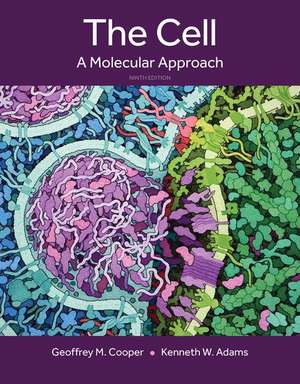The Cell: A Molecular Approach
Autor Geoffrey Cooper, Kenneth Adamsen Limba Engleză Hardback – 25 apr 2023
Preț: 1195.08 lei
Preț vechi: 1637.10 lei
-27% Nou
Puncte Express: 1793
Preț estimativ în valută:
228.70€ • 248.34$ • 192.11£
228.70€ • 248.34$ • 192.11£
Carte disponibilă
Livrare economică 01-15 aprilie
Preluare comenzi: 021 569.72.76
Specificații
ISBN-13: 9780197583722
ISBN-10: 0197583725
Pagini: 816
Dimensiuni: 216 x 276 mm
Greutate: 2.46 kg
Ediția:9
Editura: Oxford University Press
Colecția OUP USA
Locul publicării:New York, United States
ISBN-10: 0197583725
Pagini: 816
Dimensiuni: 216 x 276 mm
Greutate: 2.46 kg
Ediția:9
Editura: Oxford University Press
Colecția OUP USA
Locul publicării:New York, United States
Recenzii
I really liked everything I saw [in the revision plan]! I'm very excited with the way it sounds! The new organization is more likely to allow a pick-and-choose approach in which the selection of specific chapters to cover in class is greatly facilitated as the topics have been separated in a much clearer way. Furthermore, the order in which the different topics will be presented in the updated version follows a much more logical progression. It is true that somebasic knowledge is needed before some of the technical aspects can be understood and appreciated. Furthermore, adding more videos and introducing videos that follow a more lecture-like format is a fantastic idea." - German Rosas-Acosta, University of Texas El Paso
I think this is a fantastic revision plan and endorse all the ideas -greater selection of chapter questions, activities, digital resources, and easier access to the digital resources are particularly appealing." - Jason Bush, California State University Fresno
I like the addition of the cancer section and the neurodegen section at the end. I include a lot of that stuff in my course (not necessarily in as much detail in the neurodegen case) as a way to integrate concepts into real-world problems - e.g. practicing applying the concepts and understanding that they apply to these biomedical issues." - Laura Francis, University of Massachusetts - Amherst
Addressing basic chemistry, biomolecules, protein structure and function, enzymes, and molecular biology out the gate is a good idea. The rest of the course builds on these concepts." - Ashok Upadhyaya, University of South Florida, Alberts user
I think this is a fantastic revision plan and endorse all the ideas -greater selection of chapter questions, activities, digital resources, and easier access to the digital resources are particularly appealing." - Jason Bush, California State University Fresno
I like the addition of the cancer section and the neurodegen section at the end. I include a lot of that stuff in my course (not necessarily in as much detail in the neurodegen case) as a way to integrate concepts into real-world problems - e.g. practicing applying the concepts and understanding that they apply to these biomedical issues." - Laura Francis, University of Massachusetts - Amherst
Addressing basic chemistry, biomolecules, protein structure and function, enzymes, and molecular biology out the gate is a good idea. The rest of the course builds on these concepts." - Ashok Upadhyaya, University of South Florida, Alberts user
Notă biografică
Geoffrey Cooper is a Professor of Biology at Boston University. Receiving a Ph.D. in Biochemistry from the University of Miami in 1973, he pursued postdoctoral work with Howard Temin at the University of Wisconsin, where he developed gene transfer assays to characterize the proviral DNAs of Rous sarcoma virus and related retroviruses. He then joined the faculty of Dana-Farber Cancer Institute at Harvard Medical School in 1975, where he pioneered thediscovery of oncogenes in human cancers. He moved to Boston University as Chair of Biology in 1998 and subsequently served as Associate Dean of the Faculty for Natural Sciences, as well as teaching undergraduate cell biology and continuing his research on the roles of oncogenes in the signaling pathways that regulatecell proliferation and programmed cell death. He has authored over 100 research papers, two textbooks on cancer, and an award-winning novel, The Prize, dealing with fraud in medical research.Kenneth W. Adams is an AssociateProfessor of Biology at Bridgewater State University. He earned a Ph.D. in Molecu-lar Biology, Cell Biology, and Biochemistry from Boston University in 2006, where he investigated the role of Bcl-2family members in the regulation of apoptosis downstream of PI 3-kinase signaling in the lab of co-author Geoffrey M. Cooper. His subsequent postdoctoral research was con-ducted with Bradley T. Hyman at Massachusetts General Hospital, where he investigated the mechanisms through which apolipoprotein Eand its receptors affect susceptibil-ity to Alzheimer’s disease. He then joined the Undergradu-ate Neuroscience Program at Boston University as a post- doctoral faculty fellow and lecturer, during which his re-search focused on the transcriptional network that drives neuronal differentiation usingPC12 cells as a model. In 2013, he joined the faculty of Bridgewater State Univer-sity, where he initially continued his focus on the molecular mechanisms that mediate neuronal differentiation but has morerecently returned to the Alzheimer’s work he conduct-ed during his postdoctoral research. In 2016, Kenneth was awarded the Presidential Award for Distinguished Teaching at Bridgewater State University, where he also serves as the Director of Undergraduate Research.
